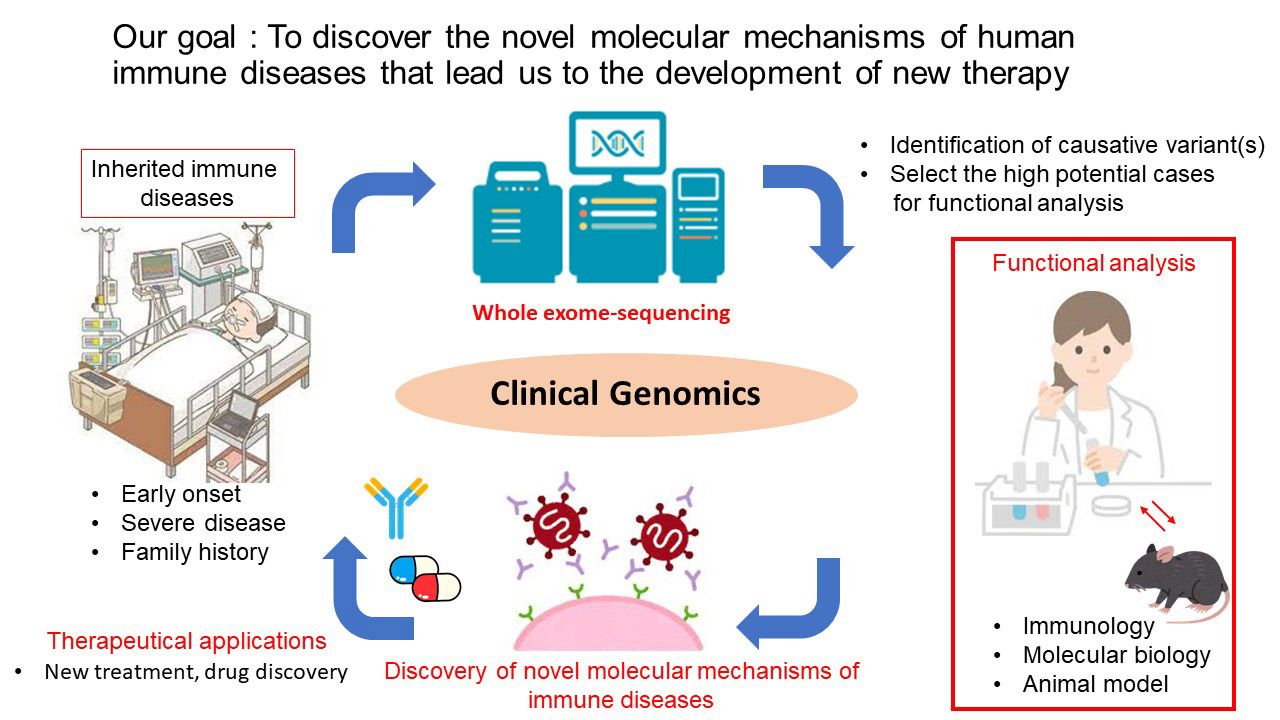
-
Kazuyuki MEGURO
Researchmap
Assistant ProfessorChiba University Institute for Advanced Academic Research / Chiba University Hospital
Keywords
Inborn Errors of Immunity, Autoimmune diseases, Immunodeficiency, Immunology, Clinical genomics
Professional Memberships
The Japanese Society of Internal Medicine, Japan College of Rheumatology, Japanese Society for Immunology, The Japanese Society of Clinical Immunology, Japanese Society of Allergology, Japanese Society for Immunodeficiency and Autoinflammatory Diseases, The Japan Society of Human Genetics
Research Theme
Genetic analysis of the patients with immunodysregulatory diseases

Abstract
We conduct comprehensive genetic analysis of patients with inborn errors of immunity to understand how human immune system fundamentally works and the pathophysiology of immune diseases. Traditionally, studies on immune system and the molecular basis of immunological disorders have predominantly relied on inbred mouse models. This approach has led to significant breakthroughs, providing substantial insights into innate immunity, adaptive immunity, and immune disease mechanisms, and it remains a powerful research tool today.
However, there are some critical limitations of animal moldels, particularly concerning
(1) differences of immune systems between of humans and rodents, and (2) discrepancies between laboratory animal disease models and actual human immune disorders in real workd. Thanks to the recent progress in DNA sequencing technologies, comprehensive human genome analysis is becoming more accessible. It is generally believed that immune disorders are caused by complex interactions between genetic and environmental factors. Nonetheless, some patients exhibit a strong genetic predisposition to their condition. These patients tend to have certain distinguishing characteristics, such as
(1) early onset of disease,
(2) severe disease conditions,
(3) multi-system abnormalities, including neurological and hematological anomalies, or distinctive facial features in addition to immune dysfunction
(4) family history of immune disorders
By collaborating with such patients, we perfomr whole-exome sequencing (WES) for their entire family to identify genetic variants causing the disease. We then investigate how genetic variants lead to immune disorders using molecular biology, immunology, and sometimes animal models. Thus, WES is not only a diagnostic tool but also a means to elucidate a novel disease pathophysiology and contribute to the development of novel therapeutic strategies for clinical applications.
Our research has already led to significant findings, including studies on a patient with systemic lupus erythematosus caused by the Toll-like receptor 7 (TLR7) variants and the development of a novel lupus mouse model based on the genetic variant. Additionally, we are engaged in fundamental research aimed at identifying and characterizing the pathophysiology of various rare immune disorders, such as GATA2 deficiency and DKC1 deficiency.
